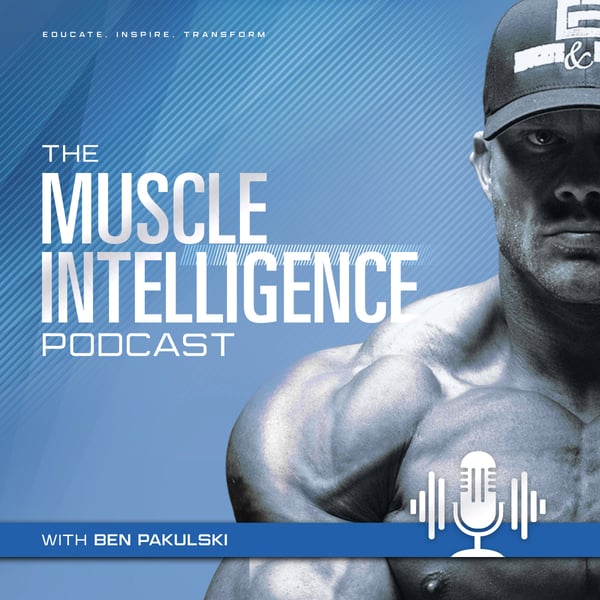The Core Four Resilience Model #313
Muscle Intelligence
Ben Pakulski
4.8 • 745 Ratings
🗓️ 27 March 2023
⏱️ 25 minutes
🧾️ Download transcript
Summary
If you’re a man over 35 looking for a simple, effective and personalized plan to help you look, feel and perform better than you did in your 20s, head to https://muscleintelligence.com/mipapply to learn more about our upcoming programs.
If you want to make sure you don’t wake up in one, five, or 10 years from now looking and feeling in a way you never wanted to… then building resilience is crucial.
After age 35, there's no such thing as "status quo." Your ability to perform, your physical capability, and psychological flexibility... all recede. And eventually quality of life diminishes... UNLESS you pay attention to each of the Four Areas of Resilience I share in this episode today.
This episode will teach you how to stop the decline and, more importantly, find out how to fill the gap between where you are now and where you want to be.
You'll learn:
-
The REAL Problem Behind your “Nutrition” Issue
-
How to Set Up Daily Habits to Create the MOST Success
-
The Mindset Shift to Apply to Fitness, Business, AND Relationships
-
The #1 Lever to Get your Body to Burn Fat More Effectively
-
How to Use Movement as the GREATEST Lever for Resiliency
Get the full episode guide at muscleintelligence.com/learn
Muscle Intelligence has opened the doors temporarily for new members ready to start in Spring 2023. We train Champions. If you’re interested, click here to see if you qualify.
Transcript
Click on a timestamp to play from that location
| 0:00.0 | I want to talk about the four areas of resilience that we ultimately focus on with you guys. |
| 0:14.0 | You guys may or may not know. I'm in the process of writing enormous amount of content, |
| 0:18.0 | filming an enormous number of videos. we're building a new program, |
| 0:23.6 | which is really the idea of it is called phase one. |
| 0:27.1 | And what I believe is everyone needs to do to lay a foundation for long-term progress. |
| 0:28.9 | There's four areas of resilience. |
| 0:29.9 | I thought I would share them with you. |
| 0:33.4 | And resilience can be thought of as capabilities, right? |
| 0:40.7 | So the four areas are ultimately physical resilience or physical capability, we'll say, |
| 0:47.3 | metabolic resilience or metabolic flexibility, physiological flexibility, and psychological flexibility. |
| 0:53.5 | So you have physical, metabolic, physiological, and psychological. And the difference people ask, what the difference |
| 0:54.1 | from physiological and physical? Physical is about movement, physiological is about like internal |
| 0:57.8 | processes, the internal regulatory processes like pH and oxygen and fuel use, which maybe is |
| 1:05.5 | interchangeable with metabolic flexibility. Those are your major areas that we as coaches focus on for you. And |
| 1:13.2 | the reason I think this is relevant because some of you guys may not know what challenge you're |
| 1:18.7 | having, right? So everyone comes into our coaching community. You can imagine everyone says, |
| 1:23.2 | what do you think the biggest problem is? My nutrition is my biggest problem. How many people |
| 1:26.8 | believe that? |
| 1:33.7 | While it may be true, it's important to acknowledge that nutrition is a behavior. |
| 1:39.5 | Nutrition isn't a food thing. It's a behavior problem for most people. And so what's that mean? While most people are eating in a way that is supporting stress or eating habitually, mindlessly. |
| 1:48.1 | So we're off the bat. |
| 1:49.0 | Nutrition isn't inherently a nutrition problem. |
... |
Please login to see the full transcript.
Disclaimer: The podcast and artwork embedded on this page are from Ben Pakulski, and are the property of its owner and not affiliated with or endorsed by Tapesearch.
Generated transcripts are the property of Ben Pakulski and are distributed freely under the Fair Use doctrine. Transcripts generated by Tapesearch are not guaranteed to be accurate.
Copyright © Tapesearch 2025.

